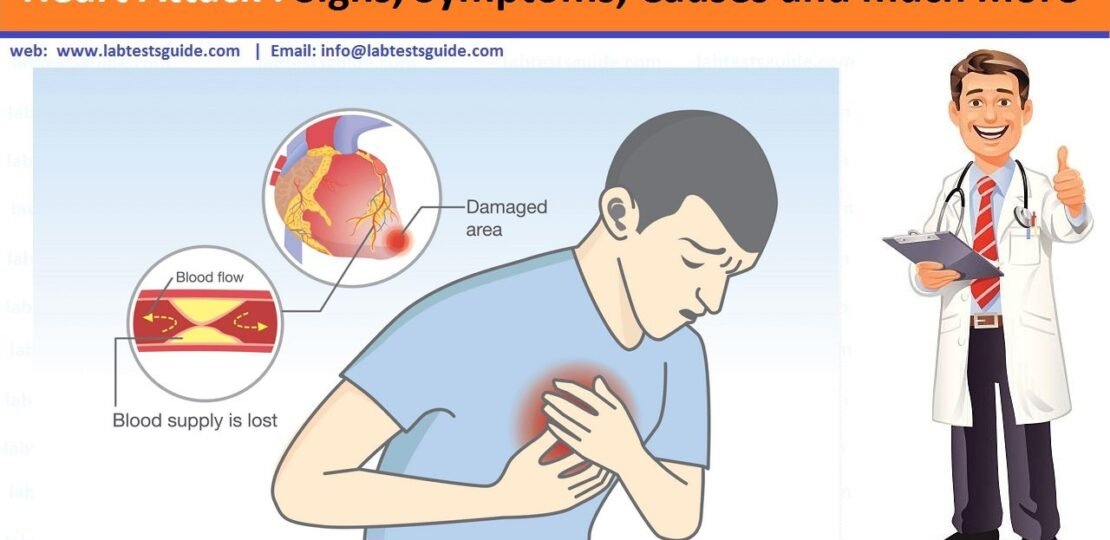
A heart attack is a medical emergency in which the supply of blood to the heart becomes blocked, often as the result of a blood clot.

A heart attack is the death of a segment of heart muscle caused by a loss of blood supply. The blood is usually cut off when an artery supplying the heart muscle is blocked by a blood clot.
Other terms used for a heart attack include myocardial infarction, cardiac infarction, and coronary thrombosis. An infarction is when the blood supply to an area is cut off, and the tissue in that area dies.
Symptoms Of Heart Attack :
There are clear symptoms of a heart attack that require immediate medical attention.
A feeling of pressure, tightness, pain, squeezing, or aching in the chest or arms that spreads to the neck, jaw, or back can be a sign that a person is having a heart attack.
The following are other possible signs and symptoms of a heart attack occurring:
- coughing
- nausea
- vomiting
- crushing chest pain
- dizziness
- shortness of breath called dyspnea
- face seeming gray in color
- a feeling of terror that life is ending
- feeling awful, generally
- restlessness
- feeling clammy and sweaty
- shortness of breath
- Changing position does not alleviate the pain of a heart attack. The pain a person feels is normally constant, although it may sometimes come and go.
Causes of Heart Attack :
The following factors are associated with increased risk of a heart attack:
- Age: Heart attacks are more likely when a man is over 45, and when a woman is over 55.
- Angina: This causes chest pain due to lack of oxygen or blood supply to the heart.
- High cholesterol levels: These can increase the chance of blood clots in the arteries.
- Diabetes: This can increase heart attack risk.
- Diet: For example, consuming large quantities of saturated fats can increase the likelihood of a heart attack.
- Genetics: A person can inherit a higher risk of heart attack.
- Heart surgery: This can lead to a heart attack later on.
- Hypertension: High blood pressure can put unnecessary strain on the heart.
- Obesity: Being significantly overweight can put pressure on the heart.
- Previous heart attack.
- Smoking: Smokers are at much higher risk than non-smokers.
- HIV: People who are HIV-positive have a 50 percent higher risk.
- Work stress: Those who are shift workers or have stressful jobs can face a higher heart attack risk.
Physical inactivity is a factor in heart attack risk, and the more active people are, the lower their risk of having a heart attack.
Risk factors
A number of factors can put you at risk for a heart attack. Some factors you can’t change, such as age and family history. Other factors, called modifiable risk factors, are ones you can change.
Risk factors that you can’t change include:
- Age. If you’re over age 65, your risk for having a heart attack is greater.
- Sex. Men are more at risk than women.
- Family history. If you have a family history of heart disease, high blood pressure, obesity, or diabetes, you’re more at risk.
- Race. People of African descent have a higher risk.
Modifiable risk factors which you can change include:
- Smoking
- High Cholesterol
- Obesity
- Lack of Exercise
- Diet and alcohol consumption
- Stress
Prevention a Heart Attack:
The best way of preventing a heart attack is to have a healthy lifestyle. Measures for healthy living include the following:
- Not Smoking
- Eating a balanced, healthful diet
- Getting plenty of exercise
- Getting plenty of good quality sleep
- Keeping diabetes under control
- Keeping alcohol intake down
- Maintaining blood cholesterol at optimum levels
- Keeping blood pressure at a safe level
- Maintaining a healthy body weight
- Avoiding stress where possible
- Learning how to manage stress
It may be helpful for people to learn more about the warning signs of a heart attack, as well.
Diagnosis
Any doctor, nurse, or healthcare professional will send someone straight to hospital if they suspect they may be having a heart attack. Once there, several tests may be done, including:
Treatments of Heart Attack:
If you’ve had a heart attack, your doctor may recommend a procedure (surgery or nonsurgical). Procedures can relieve pain and help prevent another heart attack from occurring.
Common procedures include:
- Angioplasty. An angioplasty opens the blocked artery by using a balloon or by removing the plaque buildup.
- Stent. A stent is a wire mesh tube that’s inserted into the artery to keep it open after angioplasty.
- Heart bypass surgery. In bypass surgery, your doctor reroutes the blood around the blockage.
- Heart valve surgery. In valve replacement surgery, your leaky valves are replaced to help the heart pump.
- Pacemaker. A pacemaker is a device implanted beneath the skin. It’s designed to help your heart maintain a normal rhythm.
- Heart transplant. A transplant is performed in severe cases where the heart attack has caused permanent tissue death to most of the heart.
Your doctor may also prescribe medications to treat your heart attack, including:
- aspirin
- drugs to break up clots
- antiplatelet and anticoagulants, also known as blood thinners
- painkillers
- nitroglycerin
- blood pressure medication
Related Articles:
RELATED POSTS
View all

